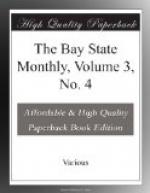CONCORD MEN AND MEMORIES.
By George B. Bartlett.
On a pleasant June morning after a long drive through shady country lanes, the little pile of rocks was reached, which for two hundred and fifty years has marked the western corner of the lot, six miles square, granted to form the plantation at Musketaquid on the second of September 1635. Resting here in the shadow of the pines, listening to the busy gossip of the squirrels, many scenes and people which have made the town of Concord, Massachusetts, so noted, seemed to pass in review, some of which will here be recounted.
Perhaps on this spot Simon Willard and his associates may have stood, and these rough rocks been laid in place by their hands. Peter Bulkeley, the wise and reverend, may have consecrated this solemn occasion with prayer in accordance with the good old custom of the time. To the two gentlemen above-mentioned the chief credit of the settlement of Concord is mainly due. Attention was early called to the broad meadows of the Musketaquid or ‘grass grown river’ and a company marched from the ancient Newtown to form a settlement there early in the fall of 1635. Few of the thousand pilgrims who arrive every year over the Fitchburg and Lowell railroads can imagine the discomforts of the toilsome journey of these early settlers as they penetrated through the unbroken wilderness and wet and dreary swamps, devoting nearly two weeks to the journey now easily accomplished in forty minutes. Many of their cattle died from exposure and change of climate, and great heroism and courage were required to make them persevere. They were kindly received by the Indians who were in possession of the lands along the rivers, and who finally consented to part with them so peacefully, that the name of the town was called Concord.
Near the present site of the hotel stood an oak tree under which tradition locates the scene of these amicable bargains. On a hill at the junction of the Sudbury and Assabet rivers, rumor also locates the lodge of the squaw who reigned as queen over one of the Indian tribes, and thus introduced into the village female supremacy which has steadily gained in power ever since. Later the Apostle Eliot preached here often, and converted many dusky followers into “Praying Indians.” Remnants of their lodge-stones, arrow-heads and other relics were abundant half a century ago in the great fields and other well known resorts, and a large kitchen-miden or pile of shells, now fast becoming sand, marks the place of one of their solemn feasts. The early explorers seem to have built at first under the shelter of the low sand-hills which extend through the centre of the town, and perhaps some of them were content to winter in caves dug in the western slopes. Their first care was for their church which was organized under the Rev. Peter Bulkeley and John Jones as pastor and teacher, but after a few years Mr. Jones left for




